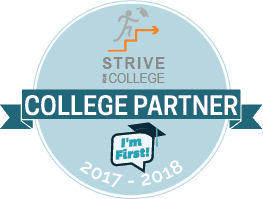Strive for College increases college attainment and success for deserving young people
 Belmont University has partnered with nonprofit Strive for College to strengthen college opportunities for low-income, first-generation college students. By becoming a Strive for College Partner, Belmont has demonstrated a commitment to enrolling
Belmont University has partnered with nonprofit Strive for College to strengthen college opportunities for low-income, first-generation college students. By becoming a Strive for College Partner, Belmont has demonstrated a commitment to enrolling
and graduating low-income and first-generation college students and through Strive’s programs will promote and strengthen their campus programs and support services for these students.
An estimated 24 percent of students enrolled in college are low-income, first-generation college students. But only 10 percent of these students earn a bachelor’s degree six years out from high school. “The alarming dropout rate among first-gen college students illustrates the importance of programs that promote better college opportunities for these students,” says Strive for College founder and CEO Michael J. Carter, “Alongside schools like Belmont, we aim to change this trend.”
Strive for College’s programs provide numerous resources to educators and students alike. For College Partners, there is a learning community where colleagues can share best-practices and model successful programs for recruiting and retaining first-generation college students. For students, Strive’s virtual mentoring program connects aspiring college students with dedicated mentors to receive one-on- one guidance and support through the college admissions and financial aid application process. Strive’s custom-built technology platform has advanced communications features like video chat and data-powered college
matching tools to help students discover and connect with colleges like Belmont. Belmont is also helping to mobilize mentors from its campus community and alumni network to assist students.
Belmont is also featured in Strive’s “I’m First!” Guide to College, the only comprehensive college guidebook for first-generation college-bound students, and participates in the ImFirst.org website featuring student videos stories, blogs and advice from and for first- generation college students.
As part of its efforts to support first-generation students, the University considers every admitted freshman for merit based scholarships and administers a wide array of need-based financial aid programs. Moreover, an in-depth summer orientation program prepares students for college life, and once they arrive on campus, support services are available via academic advisors, free learning centers and tutoring programs, as well as a variety of student organizations that promote leadership skills and cultural awareness.
Belmont Associate Provost and Dean of Enrollment Services David Mee said, “Belmont University is committed to offering programs and services that can help all our students reach their full potential, and so we are very proud be in partnership with Strive for College. This is the kind of community and resource that prospective students and families need when considering which college is right for them.”
About Strive for College
Strive for College was founded in 2007 by Michael J. Carter, then a student at Washington University in St. Louis, to help underserved area high school students apply to college and navigate financial aid. College students volunteered as in-person mentors for high school students, and mentored students achieved substantially better college go-on rates than their non-mentored peers. Strive for College grew to become a respected college access organization, serving in-person mentoring across the country. Delivering its mentoring service at sufficient scale to make a meaningful impact on the national college access problem soon became Strive’s biggest challenge, which led to the development and launch of Strive’s online platform in 2014. Online mentoring by Strive for College is now a national service, which is intended to serve one-million students within three years.
Since merging with the Center for Student Opportunity in 2016, Strive for College now runs ImFirst.org and publishes the I’m First! Guide to College in support of first-generation college students, and partners with nearly 200 four-year colleges and universities to promote and strengthen their efforts on behalf of these students.


